Have you been wondering how to use AI for SEO? Then you have reached the right place. In the process of learning about AI and SEO, most people cannot comprehend how they can be used together to get better search results on web pages.
As AI becomes increasingly prevalent across various industries, let’s explore how it brings significant benefits to the realm of SEO.
Automated artificial intelligence has made many tasks easier from searching the right keyword to providing information for a related topic. Plus, it helps refine your website’s content, making it more likely to rank higher on search engine results pages (SERPs).
Let’s explore what artificial intelligence really is and how it can benefit your website from an SEO standpoint. We’ll begin by gaining a deeper understanding of AI itself.
What is AI?
Artificial Intelligence (AI) refers to computer systems that are designed to perform tasks that usually require human intelligence, such as learning, problem-solving, and decision-making. While AI can operate independently, it often benefits from human guidance to optimize its performance and improve content quality.
Moreover, Artificial Intelligence (AI) uses advanced methods in machine learning and Natural Language Processing (NLP) to give machines the power to understand, interpret, and interact with human language.
Natural Language Processing, or NLP, is an important part of Artificial Intelligence that deals with how computers interact with human language. Machine learning helps AI systems to learn from a lot of data, find patterns, and make smart choices based on what they learn.
This allows computers to comprehend written and spoken words, gauge emotions, convert between languages, and create replies that seem like they’re from a person. By merging these abilities, artificial intelligence connects how people talk with how machines can grasp it, opening up uses in things like digital helpers, automated chat systems, and language conversion tools.
Impact of AI Tools in SEO World
SEO (Search Engine Optimization) is about making a website more visible in search results, which is important for the success of your online business.
AI is changing many areas, including SEO. As a result, there are many methods and features that can help improve website rankings and online visibility.
AI-powered SEO tools use machine learning to analyze large amounts of data, providing useful information about how users behave, what they search for, and what is popular. This helps you make smart decisions.
How to Use AI for SEO : 7 Useful Tips and Tricks
Now, you have known what AI is and its useful impacts on SEO here we are going to give you some useful tips and tricks to use the potential of AI for the betterment of SEO structure and further more.
Following are some of the best tricks that one can follow:
1. Competitor Research
In the highly competitive, AI-driven market, where businesses are optimizing their SEO strategies, it’s crucial to understand the competitors we aim to challenge. AI can help identify key competitors and enhance our decision-making process, enabling us to develop more effective company strategies.
Get a clearer picture of your competition with AI insights that show you their rankings, content focus, and tone. You can identify the weaknesses and enhance the areas where your competitors may be lacking. For instance, use AI to analyze the highest-ranking pages for a particular search and discover methods to improve your content further.
2. AI- Powered Keyword Discovery
Keywords play a crucial role in determining how high your website appears on search engine results pages (SERPs) and in achieving good search engine optimization (SEO) performance.
It’s the bridge between how people look for things online and how they end up on your website. If you do a good job finding the right words to describe your site, more people are likely to find it, visit, and maybe buy something or learn what they need.
How to use AI for Keyword Research?
AI has significantly advanced in identifying the most commonly used keywords. In the past, people had to manually inspect a website’s pages to determine the main keywords. Today, AI tools can examine large amounts of information to quickly and precisely spot important search words and patterns.
Let’s follow these simple AI tools in finding the perfect keyword for your blog post or website. There are many AI-powered sites like Google Keyword Planner, SemRush, Ahrefs, and so on.
We’ll show you how to use Semrush for this, but you can choose any tool to begin your keyword research.
Go to Semrush, create an account, and on the main screen, you’ll find the Keyword Magic Tool. Type in the keyword you’re interested in and press the Search button.

Semrush will now display all the important short and long-tail keywords, as well as any other keywords we might have overlooked during our manual search.
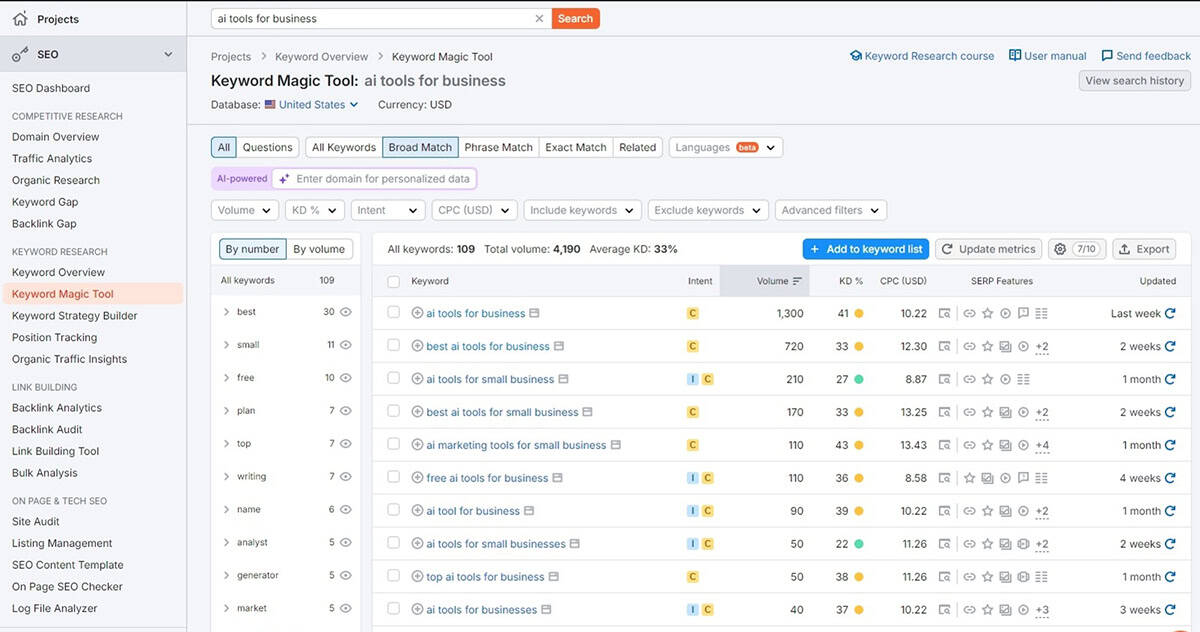
When the results appear, you’ll find a list of keywords along with information such as user intent, the number of searches, the difficulty of ranking for that keyword (KD), and other features of search engine results pages. You can modify and improve these results to suit your requirements.
What do AI research tools help accomplish?
AI research tools automatically help you find important keywords. They also connect you with keywords you might not know, so you don’t miss them in your blog post or website.
The AI keyword models are tested and trained to collect the kind of information we need, which gradually helps improve the results.
Moreover, these tools also ensure that the AI is fair and free from bias, so everyone is treated the same. After the AI is set up and running, these tools help you use it and watch its performance, making sure it works as intended.
3. Analyzing Keywords for User Intent
Now that you understand how important keywords are in the world of search engine optimization (SEO), learn about the different reasons people have when they search for products online.
Understand the user’s purpose and search query more clearly. When writing a blog, make sure you know who your intended audience is. We can better understand what people arelooking for by considering these four points:
- Informational (I): This kind of purpose is motivated by the wish to collect information or find out more about a subject, item, or service, but without any plan to buy something right away. For example, someone might search for “how does solar power work” or “benefits of electric cars” without any plans to buy a solar panel or a car.
- Navigational (N): This type of user intent occurs when someone already knows the specific website or page they want to visit. For example, if a user types “Facebook login” or “Amazon homepage” into a search engine, they’re not looking for details about these sites; they simply want to navigate directly to them.
- Commercial (C): Users with commercial intent are looking up information because they plan to buy something soon. For example, when someone searches for “best smartphones under $500” or “top-rated laptops for gaming,” it shows they’re thinking about making a purchase and are trying to figure out which product is the best choice for them.
- Transactional (T): At this stage, users have done their research, decided on a specific product or service, and are ready to make a purchase. They are actively looking to complete a transaction, such as by searching for “buy iPhone 14” or “order new running shoes.” Their intent is clear: they want to finalize the purchase and pay for their chosen item.
Why Understanding What Users Want Helps with SEO?
Understanding what users want is crucial for effective SEO. Here’s why: Knowing a user’s intent helps you tailor your content to meet their needs. Before writing a blog post or article, it’s important to understand who your target audience is and what they’re looking for. By aligning your content with their intent, you can choose the right keywords and structure your post in a way that attracts the right visitors. This not only increases the chances of your site getting more traffic but also potentially converts informational searches into transactional ones. For example, if users come for information but find useful links or compelling calls to action, they might be more inclined to consider a purchase.
How to Use AI for Search Intent Analysis?
Artificial Intelligence makes it easier to figure out what people are looking for when they search online. Here’s how you can use AI to understand and improve what people want from their searches:
Begin by using a strong AI research tool such as Semrush or Surfer SEO. After you look up keywords related to your article or website, you’ll also find a column showing the search intent for each keyword.
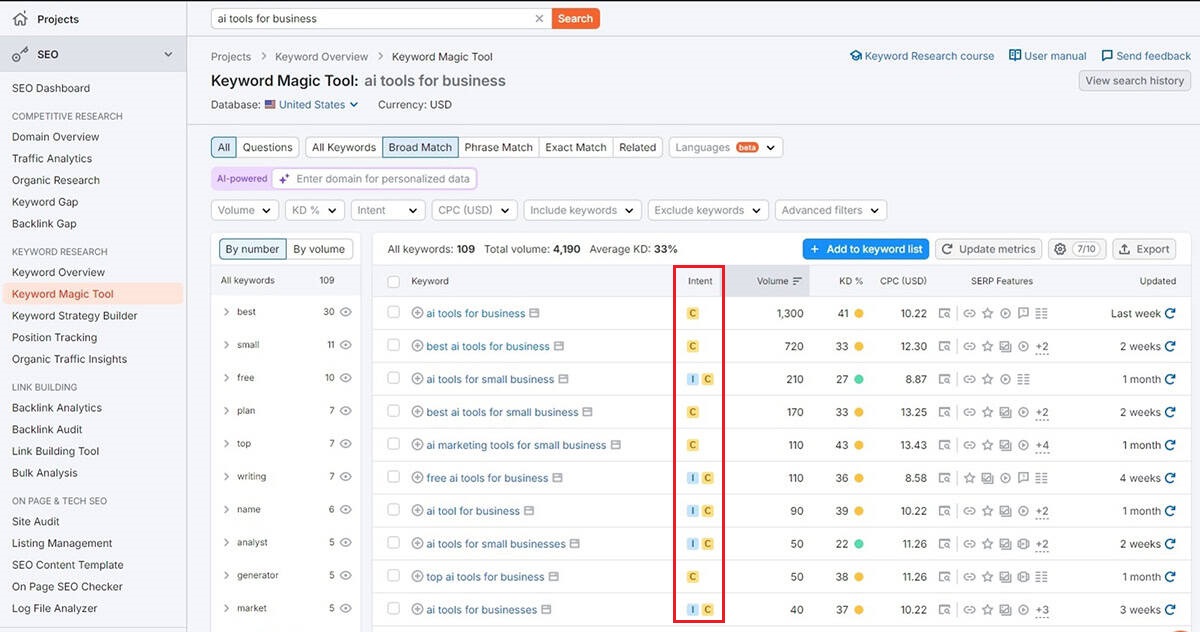
By now, you should understand what user intent means. For instance, if your content aims to attract an audience with commercial intent (C), you can improve your content by adding and adjusting keywords to match your content’s focus.
Selecting a dependable AI tool and keeping informed about keyword characteristics and their popularity in searches is crucial because this data can vary.
The purpose behind searches and keyword statistics can evolve due to changes in how people use the internet, market conditions, and improvements to search algorithms. Frequently reviewing and tweaking your approach according to the most recent information ensures that your content stays up-to-date and performs well.
4. Creating Specialized Content
Content is essential for a well-organized website. Before, creating content was done only by people, and it took a lot of time. It was challenging to think of ideas, choose the right words, and write original content.
But now, with the help of artificial intelligence (AI), making content and coming up with ideas has become much easier and faster. AI tools can help you write articles, blog posts, and other written content quickly. They can look at a lot of information, suggest good topics, and even make the content better for search engines so that more people can find it.
Artificial intelligence improves more than just written material; it also makes creating other types of media easier. For instance, AI can create detailed pictures, turn text into spoken words for podcasts or videos, and make personalized marketing items.
How to Use AI for SEO for Content Creation
Special tools and add-ons made for making content are getting more and more popular these days. Some of them are free to use, but others might ask you to pay for some extra features.
Some of the trending tools that you can use are ChatGPT, Gemini, HumanizeAi.
Let’s begin creating content using ChatGPT. Ensure you choose a primary keyword to use on your website with the goal of improving your search engine visibility.
You’ll need to sign up for an account first. After logging in, you’ll see a chat-like interface where you can enter your prompts, such as:
Write a description for About us page of the website [website name] using the keyphrase [focus keyword]

In a matter of time the AI tool will not only create the content for the page that you have inputed but also make it SEO friendly by adding the main keyword.
SEO practices highlight the need for content that balances search engine optimization with engaging, valuable information for readers. Automated content may miss the nuances and creativity that human writers provide.
For this you can choose tools like HumanAi to make your content more original.
Some Other content Creation AI Tools
- Image Creation : Canva
- Video Creation: Pictory, InVideo
- Content Optimization: Grammarly
- Social Media Posts: Lately.ai, Hootsuite’s Composer
- Audio Content Creation: Audacity, Descript
5. Analysing KPI and Other Page
A Key Performance Indicator (KPI) is a measuring tool that evaluates how a company or an organization is achieving its key business goal effectively.
By focusing on particular measurements, Key Performance Indicators (KPIs) help companies monitor their advancement, make smart choices, and ensure that teams are responsible for their actions.
Knowing who you’re up against and what’s expected in your field is really important for a business to grow. Key Performance Indicators, or KPIs, give a simple way to see how well a company is doing compared to others in the same industry.
KPIs automatically analyze your site’s content against relevant competitors and offer suggestions to enhance your SEO strategy.
How does KPI work?
For websites, key performance indicators (KPIs) are crucial measures that help in understanding how well the site is doing. The measures may include the number of visitors, the percentage of people who leave quickly, the rate at which visitors complete a desired action, the average time people spend on the site, how fast pages load, and the rate at which people click on links (CTR).
It’s possible that some of your pages will attract many visitors, but they may not spend much time there. This could suggest that you need to update your content, enhance your search engine optimization (SEO), or simplify the page for better usability.
You can find different AI tools that help you track how your pages are doing and at the same time, improve your SEO strategies.
Some of the recommended free KPI tools are: Google Analytics, Zapier, Tableau
How to Use AI for KPI
Artificial Intelligence can play a significant role in identifying the gaps where your website is lacking the effort of SEO.
Let’s use Google Analytics to see a particular site performance and its relative changes with the SEO performance as well.
You will need to visit the site and sign up for your business account providing the relevant information that it requires. You will directed to a page where you can view the overall performance of your website.
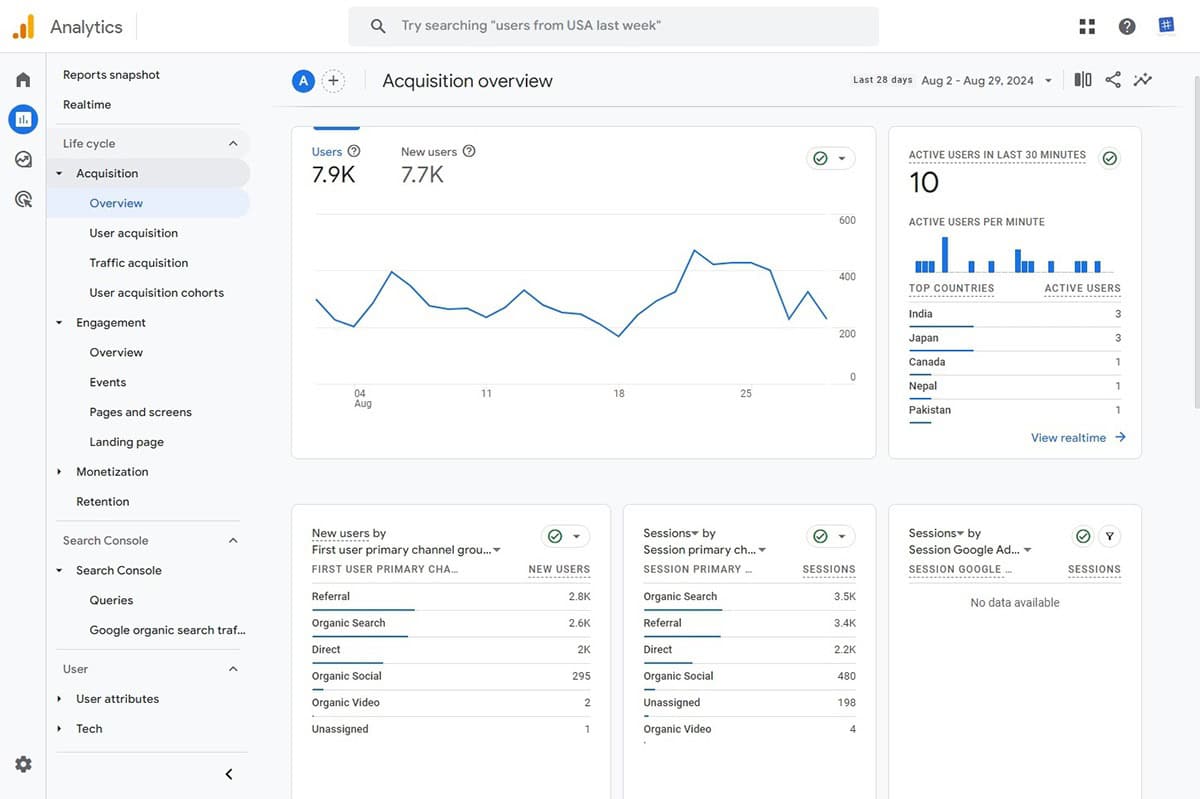
In the overview section of the page, you’ll see a summary of how well the website is doing on Google. It shows the average number of people visiting, including those who are new. The information also tells you how people found your site, such as through other websites, Google searches, typing in the address directly, social media, or videos.
To get more detailed information about a specific page you need to click on the overview tab under the engagement section.
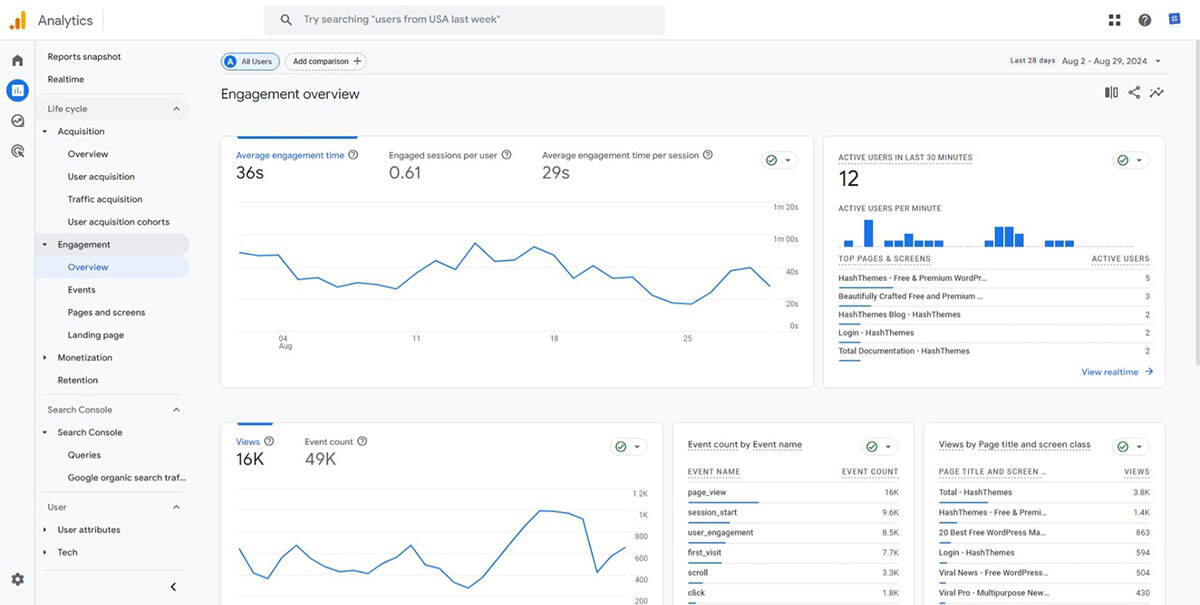
Here, you can see how much users interact with your website and how long they spend on each page. Additionally, you can identify which pages are viewed the most.
Every page/post might not excel to the target that you have set. Having a thorough understanding of this might help the pages rank better in Google positions.
Understanding which pages need improvement helps you focus on areas such as:
- Keywords
- Content
- Images
- Data updates
- and much more.
6. On-page Optimization
To improve your website’s search engine ranking, you need to work on all parts of it, starting from the basics. The main focus should be on the content of your site, but you must also make sure it’s well-optimized as you create and update it. This means adjusting all the parts that are directly on the page, like the tags, headings, and pictures, to make it easier for search engines to find your site.
So here’s an overall points to focus on for a successful on-page optimization campaign:
To improve your website’s performance in search engines, concentrate on these key areas:
- Finding the relevant keywords for the content and placing them carefully.
- Proper content structuring with the relevant headings(H1, H2, H3…) where necessary.
- Make each page’s title interesting including the main keyword. Similarly, meta descriptions and tags compel users to click on your link.
- Draft compelling well structured content that will be helpful as well as useful for your readers.
- Using images and videos that include your main keyword helps improve your site’s visibility in search engine results pages (SERPs). This practice can lead to your website being suggested when users search as well as make the content presentable.
- Connecting your content to related pages using clear and descriptive words as links can help you rank better in search results. This helps search engines grasp the meaning of your content and makes it easier for visitors to move around your website.
- Optimize your website for phones and tablets as well.
These tasks might appear simple at first glance, but they are actually harder to accomplish than they seem. When you’re working on optimizing a webpage, you could become so focused on the content that you overlook several important factors that have been discussed.
So, it is always a better idea to get help from AI tools to keep you focused on the main factors. We are demonstrating how to improve the on-page optimization with the AI tool Rank Math. Keep in mind that there are many other on-page optimization tools that you can discover.
Make sure you sign up for the account, once you are logged in you can directly head to the post/content that you are about to edit. Let’s see how the tool helps in the process of on-page optimization.
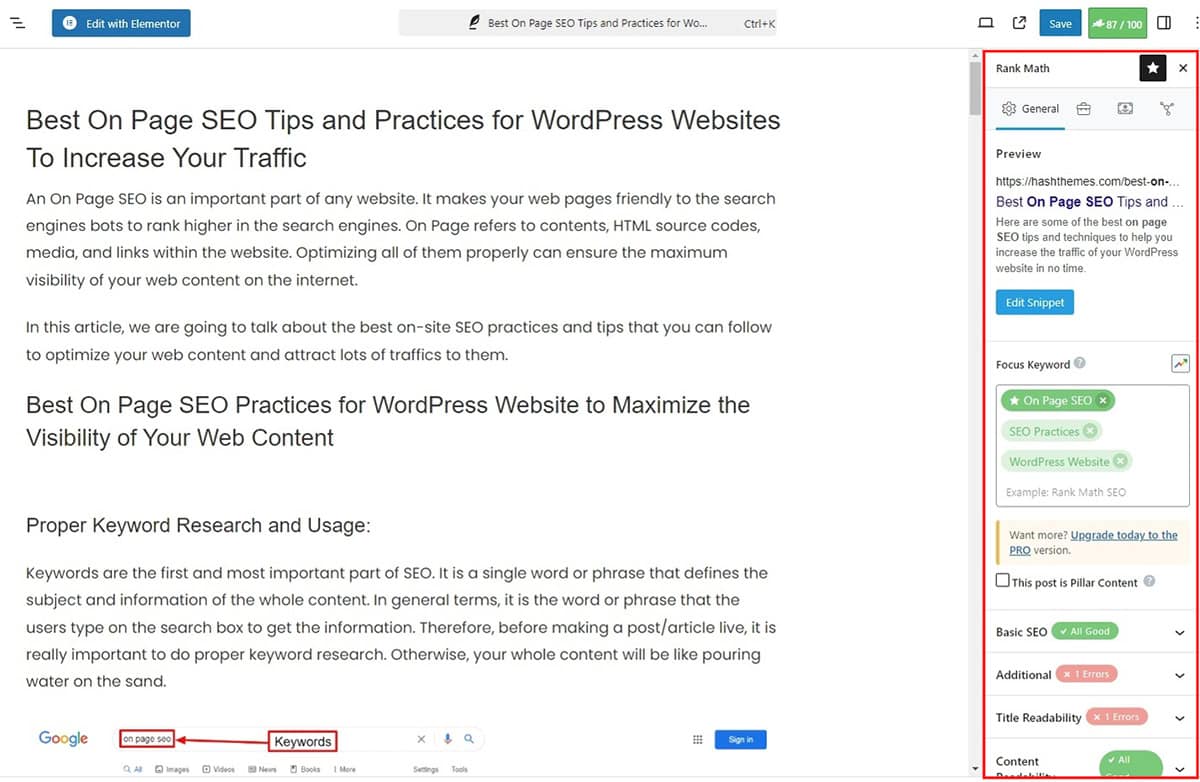
On the right side, you’ll find that the AI tool allows you to select a focus keyword for your content. Based on this main key phrase, the tool provides various sections where you can make improvements.
The basic SEO features include tracking how frequently the main keyphrase is used throughout the content, as well as its presence in headings and other key elements.
The readability of a title involves examining the main heading, paying attention to its length and whether it includes important keywords.
Content readability assesses if the content is well-organized and includes elements such as images and videos.
This process can gradually help you manage your content easily and side by side increase the chances to appear on the SERPs.
7. Find Link Building Opportunities
Link building significantly enhances a website’s performance by acquiring hyperlinks from reliable sources. These backlinks signal to search engines that your site is credible, leading to higher search rankings and increased traffic. The goal is to secure high-quality, relevant links that boost your site’s authority and visibility.
How can Link Building benefit from an SEO Perspective?
Link building is highly beneficial from an SEO perspective. Although it might seem like a small adjustment to your content, it can have a major impact on your site’s organic search results.
Let’s have some of the advantages of link building:
- Enhancing Search Engine Position: Good backlinks show search engines that your website is trustworthy and important, which can help you rank better.
- Increasing Organic Traffic: Better rankings mean more people can see your site, bringing in more visitors from search engines.
- Strengthening Website Reputation: Getting links from well-known sites improves your website’s reputation in return increasing the chances of ranking higher in the search results.
- Speeding Up Content Discovery: Backlinks help search engines find and list your content quickly.
- Attracting Visitors from Other Sites: Links from trusted sites can bring visitors directly to your site, which might lead to sales or sign-ups.
Use of AI to Enhance SEO Using Backlinks
AI can significantly improve SEO outcomes through effective backlink strategies. Not only do quality backlinks help search engines index your site more efficiently, but they also boost organic search rankings.
There are numerous AI tools available that assist in monitoring the status and performance of backlinks, alerting users when a backlink has been removed from a linked website.
Here we are going to demonstrate how backlinks can be studies using Ahrefs. You will need to sign up for the account for free or pay certain amount for the premium version with extra features.
If you head to the backlink overview section of the toll you can be able to acknowledge the overall result of your website.
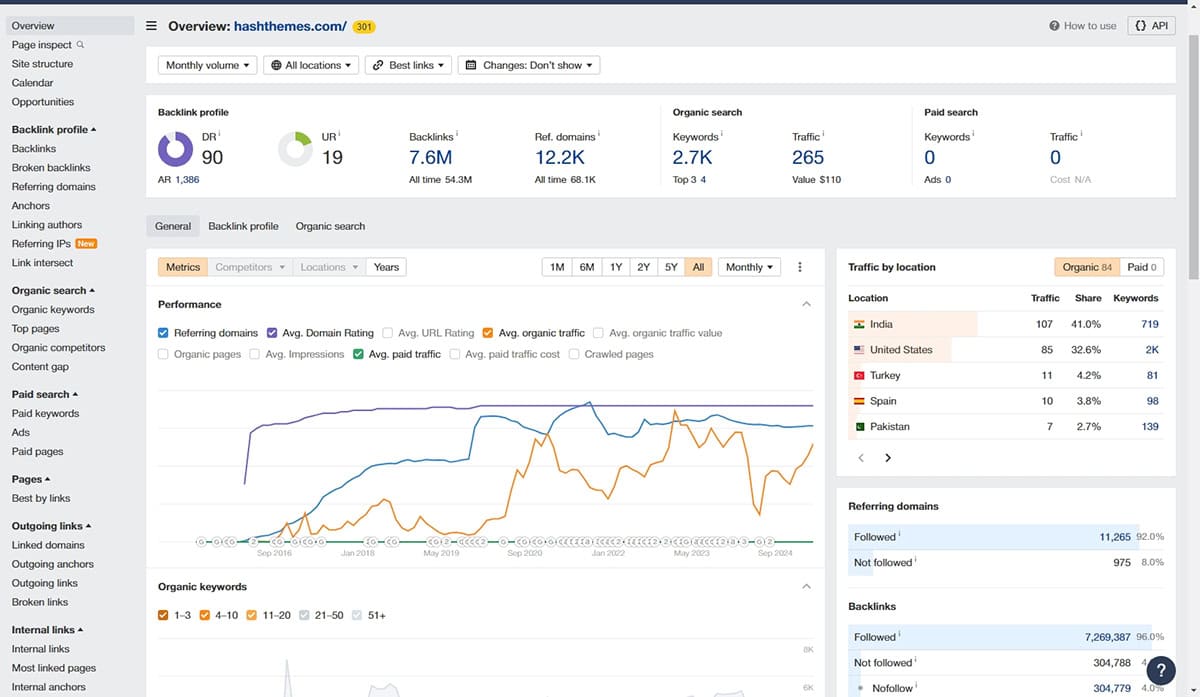
You can also look at the areas that bring people to your website through organic search, which helps you see where your audience is coming from.
This includes seeing where visitors are coming from around the globe and which websites are sending them to you.
Risk and Limitations of AI on SEO
While there are many notable advantages of AI, there are some downsides to this as well. Following are some of the risks and limitations of AI on SEO:
Excessive Optimization
A major issue with using AI for SEO is the possibility of too much optimization. AI tools, which rely on data and algorithms, might recommend forceful tactics to improve search rankings, like using too many keywords or creating an unrealistic number of links to your site. This could get your site in trouble with search engines if they notice these deceptive methods.
Dependence on Data Quality
The success of AI in improving search engine rankings depends a lot on the accuracy of the information it works with. If the data given to an AI system is wrong or not complete, it might suggest actions that don’t help or even hurt your efforts.
AI might also have trouble grasping the detailed and subtle aspects of your content, which could lead to advice that doesn’t fit your brand’s style or goals. So, even though AI can handle a lot of information fast, it’s important that people keep an eye on it and make necessary changes to ensure the data it uses is good.
Price and Availability
Advanced AI tools for SEO can be very costly, making them hard for small businesses or individual marketers to use. The high price of these tools can stop some people from using them, so they might have to choose cheaper options that may not work as well. This shows that not all companies can afford to use AI-driven SEO tools, which makes it harder for them to take full advantage of these advanced technologies.
Lack of Human Insight
AI struggles to completely understand the situation, the way something is said, and what someone means, which are important for making interesting and meaningful content. Although AI can look at information and give ideas based on what it sees, it might suggest general advice that doesn’t catch the small details of how people act and feel. People’s imagination and gut feelings are important for picking up on these small details and making content that people really connect with, showing that AI can’t completely replace human understanding.
Over Reliance on Automation
Lastly, over-reliance on AI-driven automation in SEO can lead to a lack of personalized strategies. While automation can streamline many aspects of SEO, it may result in a one-size-fits-all approach that doesn’t account for industry-specific needs or shifts in consumer behavior. AI tools might miss subtle market trends or evolving preferences, necessitating human oversight to ensure that strategies remain relevant and effective. Balancing automation with personal insight is crucial for maintaining a successful SEO strategy.
Conclusion
Integrating AI into your SEO strategy offers transformative benefits, from advanced keyword research and content creation to insightful competitor analysis and performance tracking. AI tools can streamline and enhance various aspects of SEO, leading to better visibility and higher rankings. However, it’s important to be mindful of potential risks, such as over-optimization, dependence on data quality, high costs, and the limitations of automation and human insight. Balancing AI’s capabilities with thoughtful human oversight will ensure that your SEO efforts are both effective and sustainable. By leveraging AI wisely, you can stay ahead in the competitive digital landscape and achieve lasting success in your SEO endeavors.



Really useful article — the tips on using AI for SEO are timely and smart. They strike a great balance between automation and authenticity. Thanks for sharing this!